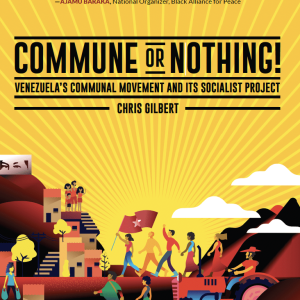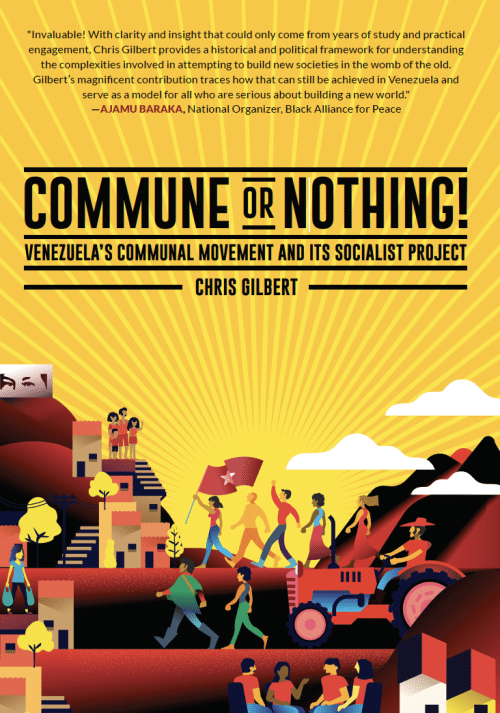Commune or Nothing! Venezuela’s Communal Movement and its Socialist Project
by Chris Gilbert
$23.00 / 208 pages / 978-1-68590-023-6
AUTHOR’S NOTE:
Karl Marx wrote that theory becomes a material force when it grips the masses. He should have added that theory usually grips the masses because it connects with ideas, projects, and dreams they have developed themselves. This is what generally happens in revolutions, and it is certainly the case for the idea of the communal project in Venezuela.
In 2009, ten years after the Bolivarian Process began, Hugo Chávez proposed the communal path to socialism in a historic television program. That project had solid bases in the thought of Marx and István Mészáros, yet it would have been dead in the water if the idea of replacing a society dominated by the logic of capital with one based on communal relations had not connected with aspirations and values already alive and operating in Venezuelan society.
As it turned out, self-organized communities around the country seized on the communal project, which resonated both with values shaped over the longue durée in Venezuela—through its enduring campesino, Indigenous, and Afro-Venezuelan traditions of self-governance—and also with newer practices and principles, such as “participative and protoganistic democracy,” that had formed during the course of the revolutionary process…
Introduction: Putting the Commune Back into Communism
There is growing awareness in our time that the post-capitalist society can only be made by people as a collective project that is neither automatic nor imposed. This in turn has contributed to a renewed interest in communes on the part of the left. But while communes today may seem to provide people with an alternative way of living and producing, they are not new. In fact, for much of humanity’s past, among diverse social groups, the principal means of production was land, and it belonged to people not as individuals but rather to the group, or the commune….
The profound connectedness of people to their communities and the control they exercised over their shared work conditions meant that only a radical violence could separate them from those contexts. Yet, as we know, that violence occurred wherever capitalism appeared; Marx described the separation with memorable words, as a process “dripping from head to toe, from every pore, with blood and dirt.” From that brutal rupture, modern society emerged, along with modern forms of exploitation and modern individualism, and other features that we associate with the capital system. Much was destroyed as a result of this violent process, and much was lost. Nevertheless, there were significant horizons of human development that eventually arose under the social formations of the capital system, formations in which abstract economic relations more than personal ones ruled people’s lives. These new horizons were especially important in the sense of breaking down barriers and overcoming (albeit in a highly unequal manner) the limited sets of needs and satisfactions under which people had formerly lived when in traditional communes.
Today, however, there is no denying the destruction of the natural environment and of human beings that the capital system has brought, where all is subordinated to an inexorable process of economic valorization that amounts to a virtual treadmill of senseless expansion. This process, far from abating, presses forward in our time with ever greater aggressiveness, with new forms of capital accumulation that prey on spheres of life previously outside of capitalism’s reach. By contrast, communal systems are more sustainable, less destructive and alienating, and, in many senses, more humanly gratifying. For these reasons, they form an attractive reference, which may seem to be an inspiring alternative in the face of the capital system. That said, the communal way of life lies far in the past for most of us, and it was sometimes the locus of traditional forms of oppression. What to do then? What is the solution to our dilemma? What futures can we aspire to at the current crossroads that humanity faces? Are we condemned forever to live with the current alienating, exploiting, and nature-destroying system that has reached across the globe? Or should
we try to recover the communal form of production and life?
Hence, our options may seem to be between present-day capitalism and what is, for most people, a historically distant communalism. However, presented as the option of choosing between the undesirable (capitalist progress) and the almost impossible (return), the question is badly posed. In fact, a revolutionary solution to the dire problems that capitalism has brought will not involve rewinding the clock entirely, but rather reaching back with a critical vision to recover those elements of communal systems, especially living and working in communal and classless societies, that can point to a future in which human beings enjoy self-determined, more sustainable, and fuller lives. But it is not only about recovery. The use of the communal form today, its adoption, should take place through a dialectical reappropriation of the past in which modern horizons of personal freedom and cultural diversity are preserved and some of capitalism’s technological advances are employed within a democratic approach to production and life that is rational, sustainable, and beneficial to both human beings and the natural environment.
This book is about that complex project of human emancipation and preservation of the Earth system. It is about communal socialism, or modern socialism using the commune as a building block. It looks at that project as it took root in a small corner of the world, in Venezuela, where today, as a result of a process of national liberation that began two decades ago, there is a contemporary effort at socialist construction based on the communal form, taking its lead from important precedents both in Latin American history and in revolutionary theory, especially that of Karl Marx. Specifically, the book tells the story of how the Venezuelan people, along with a remarkable leader named Hugo Chávez, seized on and interpreted the project of advancing toward a better future based on the commune as a socialist building block. The book looks at the steps that Venezuelan communards have taken in our time—first steps for now, taken in very difficult conditions—and the ideas and projects they have developed. It is the belief of many of us, both inside and outside Venezuela’s communal movement, that these small steps are of great importance to humanity as a whole.
The Essence of the Commune
Why build a commune? What are the advantages of the communal system? When you visit an urban commune these days in Venezuela, you might encounter various workshops and other spaces for production, or if it’s a rural commune there will be fields with crops and maybe livestock. Along with this, there will be meeting spaces and residences that surround the commune. People might seem happier or more relaxed than normal, but perhaps not. Indeed, many people will be engaged in work or leisure activities that are similar to those one sees everywhere in the capitalist world. So, what is the essence of the commune in all of this? In fact, what Bertolt Brecht said about a factory—that, from the outside, you cannot tell much about the real social relations, capitalist or socialist, operating there—applies to what you can see in a Venezuelan commune. The essence of a commune is a new set of social relations, which are usually not immediately visible. The most important of these—and a necessary feature of the communal system, as it existed before and might exist in the future—is directly social labor….
…In this new society freed from the necessity of producing exchange-values, reproducing life in its rich and diverse manifestations and the community’s well-being would be the priorities, not capital accumulation. There would be no automatic process of valorization, no senseless treadmill. Freed from the constraints of value-production, the society of associated producers—producers brought together in communes of different kinds—could dispose of time according to self-determined aims, with a view to expanding individual free time and promoting all-round human development in a way that is harmonious with the natural environment.
Ending the tyranny of value-production would also allow productive and reproductive or household work to be equally valued and bring an end to the capital system’s historic separation of these two spheres. These are the merits of the communal format. Moreover, whatever virtues the capital system had—which mainly consist in the expansion of human horizons that occurred under its reign—would have to be incorporated into the new society. Likewise, in the new communal system, technological innovation and the resulting productivity would exist in a different, more manageable form. It would be manageable inasmuch as an expansiveness that is uncontrollable or automatic is impossible by definition under a regime of directly social labor.
Genesis of the Communal Project in Venezuela
In Venezuela, the project of building socialism through a communal system emerged out of a complex historical process. Despite this complexity, it is easy to trace how the first ideals and principles that guided the Bolivarian Revolution when it emerged at the turn of the century were taken up and continued in the subsequent communal project. From the beginning, this political movement defended participative and protagonistic democracy, which was expressed in a range of documents (including some from before taking power) and also practices. The latter included massive, direct participation in the Constitutional Assembly of 1999 and subsequent referendums (1999, 2004, 2007), but also the various community organizations Chávez’s government promoted that were expressions of popular power. Most notable among these were the community councils that emerged in 2005, along with the Technical Water Forums (Mesas Técnicas de Agua) and Urban Land Committees (Comités de Tierra Urbana), all of them aimed at establishing democratic control from the grassroots….
To read more, get a copy by clicking on the below…


Comments are closed.